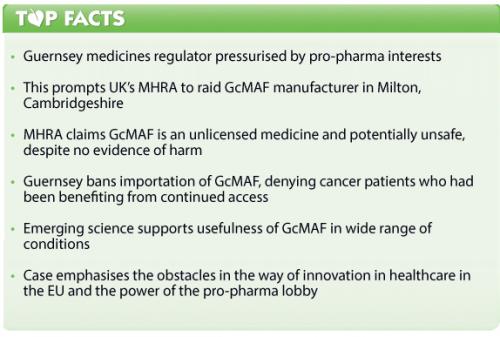Content Sections
A raid on the lab manufacturing the naturally-occuring glycoprotein called GcMAF now puts at risk hundred of Europeans dependent on the product for their health. As a glycoprotein, it’s just a sugar-coated protein, and one that is produced naturally in the body. In some people, including cancer patients, it’s production can be compromised and an increasing body of evidence suggests this may contribute to a host of health conditions including cancer and autism, to name just two. GcMAF also happens to be a powerful immune modulator. There’s of course nothing new about immune modulators, a host of different dietary ingredients ranging from zinc in meat, fish and a multitude of supplements, through to beta glucans in mushrooms and oats, are examples. The trouble is they now represent an important area for new development by Big Pharma.

An unannounced raid by the UK’s Medicine and Healthcare products Regulatory Agency (MHRA) on 4 February of the UK manufacturing premises of GcMAF in Milton, plus a lot of pressure on the authorities in Guernsey and Brussels, two key bases for Immuno Biotech, GcMAF’s primary producer, now threaten individuals’ ability to access this life-saving glycoprotein.
David Noakes, the founder of Immuno Biotech responded said, "The MHRA does not want to see this product on the market because its job is to maintain the monopoly and stick up for vested interests in the pharmaceutical industry."
UK government stealth tactics
The UK MHRA issued a warning that this ‘unlicensed medicine’ was being made in an unlicensed facility in Cambridgeshire, UK, and that anyone who had purchased it should speak to their GP. During the raid, 10,000 vials of GcMAF were seized. The justification given was that the lab didn’t reach required Good Manufacturing Practice (GMP) standards. Of particular concern for the regulators was that the ‘medicine’ was “not fit for humans” despite the fact that all the evidence suggests that healthy humans produce small amounts of the glycoprotein quite naturally. The MHRA also claimed that the product was contaminated having been made with non-sterile equipment.
It appears that the chain of events that led to the MHRA raid can be traced back to the island of Guernsey, which has long been under pressure to abide by European law affecting unregistered medicines and food supplements (e.g., see Lords Hansard record from 25 Jun 2007: Column WA92). The island’s medicines regulator has been intensively lobbied by UK authorities and business lobbies, including the UK food supplement manufacturers association.
It was in Guernsey that a complaint was initially made by pro-pharmaceutical interests in relation to the product. That stimulated an understandable response from the Guernsey residents benefitting from it. Following the raid, the importation of GcMAF has now been banned by Guernsey's authorities. However, the product has not been on sale per se. David Noakes has apparently been giving it away free in Guernsey and there are over 100 people taking it, including cancer patients, most of whom have become reliant on the benefits they’ve been receiving and report great success. Given the legal vagueness as to what is and what isn’t defined as a medicine, it seems that the MHRA is targeting the manufacturing standards and purported risk to human health as a ‘belt and braces’ approach to ceasing use of GcMAF.
The issue has triggered actions further afield. The Belgian authorities are now also investigating the contact address for GcMAF.eu in Brussels.
Freedoms denied
The Guernsey Board of Health had agreed to the importation of the GcMAF on the understanding it was not supplied for commercial gain. It now appears the MHRA’s hardline tactics may have changed their minds. The despair of the 100 or so Guersey residents who have been benefiting from taking the product is palpable as they face a possible return of symptoms and the plunge back into the abyss of their disease.
Ed Freestone, Guernsey's chief pharmacist, admits, "There is no current information suggesting the product has caused direct harm to anyone's health,” but urges “anyone concerned about the product, or its ban … to talk to their medical advisor for advice and reassurance."
Emerging science
There is now well over a decade of clinical experience with GcMAF and no evidence has emerged of any ill effects from using this natural glycoprotein. The high risks and low effectiveness of conventional oncology has driven strong interest in alternatives such as GcMAF, use of which is supported by an increasing body of persuasive evidence. The benefits of glycobiology and the scientific basis for the mode of action and effectiveness in clinical trials of agents such as GcMAF have been emerging rapidly in recent years.
Research papers have been published in highly respected mainstream journals such as Frontiers, the International Journal of Cancer Research and Treatment, the American Journal of Immunology, the Journal of Translational Oncology, and more testifying to its efficacy.
Rather than trying to stamp out something new because it doesn’t immediately have a clear legislative home, or more importantly, because it steps on the toes of interests vested in mainstream oncology, something with this much potential and cost-effectiveness, should be grasped with both hands, rather than be made illegal. But then people have never been at the heart of any of these decisions.
For the MHRA to to describe the scientists at the manufacturing lab as “hobbyists with a degree in real ale brewing” shows a further iniquitous disrespect for patient’s rights and innovation in healthcare.
Thankfully there are many who disagree, Guernsey residents, a host of clinicians, researchers and patients around the world—and NGOs like ANH-Intl will do what we can to campaign for the public right of access to this natural, health-promoting glycoprotein.
We will keep you posted on the campaign.
Call to Action by Guernsey Residents
We ask Guernsey residents to contact Ed Freestone, Assistant Director and Chief Pharmacist of Health and Social Services Department (HSSD), Guernsey and make clear your concerns about restrictions on access to GcMAF.
Contact:
Corporate Headquarters, Rue Mignot, St Andrews, Guernsey, GY6 8TW, Channel Islands
Tel: +44 1481 725241 Fax: +44 1481 235341
Email: [email protected]








Comments
your voice counts
12 February 2015 at 10:24 pm
I do not live in Guernsey but I BUY MY GCmaf through Guernsey at considerable expense and I do not like my freedom to choice being withdrawn without any consultation or warning.This is very high handed. I researched this product thoroughly and met David Noakes to ask questions and I know it is used in clinics in Germany and Switzerland by highly qualified specialist doctors.
The conventional medical scene has over the years mostly failed me miserably and I would certainly not be consulting a GP in Guernsey where GPs still deny the benefits of Vit C which is one of the vitamins in infusions that has saved my life and was administered by a qualified medical practitioner. I am now dealing with Chronic Inflammatory Response Syndrome and the GCmaf is of considerable assistance in helping to settle my immune system .
I see no records anywhere of any adverse effects of this treatment. I therefore assume it is ego trumping stuff that has prompted this ridiculous raid and would kindly ask that you clear all this nonsense and allow those who have chosen to take responsibility for our use of this treatment to continue on our healing path.I have live blood cell tests showing considerable improvement in my blood profile since starting this treatment.
14 February 2015 at 11:04 pm
Everything we eat, drink, sleep on, walk on, breathe in, wear, clean with, etc is riddled with cancer causing chemicals, stop all the poisons that are being imposed on us and we would be cancer free. All doctors, hospitals and pharmaceutical companies want to do nowadays is to bombard us with adverts telling us that every conceivable symptom is a sign of cancer. There is an advert currently being shown on tv saying if you have had heartburn for 3 weeks or more go to your doctor as it could be cancer. My god, they can't wait to irradiate the population at every conceivable opportunity, its like enforced genocide. My grandfather suffered with heartburn for 30 years, he died at the fine old age of 97, if he had visited his doctor, he probably wouldn't have seen 70. I myself have absolutely no faith and a huge fear of the current medical industry with a few exceptions, I absolutely believe they will do anything in their power to prevent a cure for cancer. Microwaving people is just too lucrative a business. When will the public stop listening to them and following their bad advice just like sheep going to the slaughter. These wonderful people trying to provide alternative treatments should be encouraged and funded instead of hounded & forced into closure, it makes me so nervous for the future of my children.
21 February 2015 at 8:47 pm
if Mr Noakes had taken the time to license his lab he would not be in the mess he is in! this company does many things illegally or close to illegally possible. There are other suppliers and their products and protocols are possibly more successful than Immuno biotech, and his claims they are 2nd rate are not true.
So
Europe and the world find another supplier that has taken the time and effort to comply.
05 March 2015 at 5:48 pm
As you will know the issues surrounding what has and hasn’t happened in Guernsey, the UK and elsewhere and with regard to Immuno Biotech are complex and not always easy to substantiate. However, we gather that some of the patients who were previously reliant on Immuno Biotech’s products have been successful in finding other sources of GcMAF in Holland and Japan.
17 January 2016 at 3:49 am
Do you really think they would've let him license his lab? Mind you a lab that was working on something that could potentially cure cancer?Absolutely not. He was doomed from the start.
26 March 2015 at 10:52 am
Totalitarianism continues, inexorably, to salami-slice away at our choices and liberties until we awake one fine day to find that Big Brother, via Big Pharma and the banks makes all the decisions as to who will live and who will die and who gets compulsory sterilisation. Actually, this is already happening. Those things prophesied by David Icke appear to be happening (view his website). Are we the people or are we the sheeple? Now go away and bury your heads in the sand .....
31 January 2016 at 6:12 pm
When your life depends on You and conventional medicine is not working, people should be given the right to make their own judgement calls on what they administer.
If it means they are able to survive and be given extra time, their choice should be considered. The drug companies are more interested in profit than saving lives. If they were so concerned with life, they would reduce the cost of cancer drugs and not sit on the fat profits they take.
29 June 2017 at 5:36 am
We have to wonder just why the FDA and MHRA are so strongly trying to stamp out GcMAF, a naturally occurring molecule in the body. Why aren't they instead doing clinical trials to test it. I know why... because it works but they can't make billions of dollars from it.
Your voice counts
We welcome your comments and are very interested in your point of view, but we ask that you keep them relevant to the article, that they be civil and without commercial links. All comments are moderated prior to being published. We reserve the right to edit or not publish comments that we consider abusive or offensive.
There is extra content here from a third party provider. You will be unable to see this content unless you agree to allow Content Cookies. Cookie Preferences